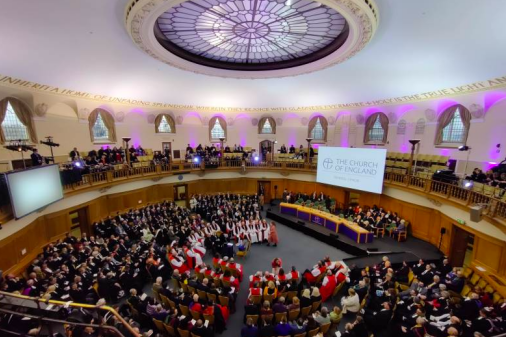
The Church of England's House of Bishops, which has just started publishing more detailed accounts of its meetings, appears to be losing its nerve over launching standalone services of blessing for same-sex couples.
The 'Summary of Actions and Decisions' from the meeting on 12 December 2023 posted on the revisionist Thinking Anglicans website records that the bishops failed to come to a decision on the standalone services.
The bishops have started publishing summaries of their meetings after facing criticism from General Synod members for not being transparent enough about their deliberations. Thinking Anglicans observed that the summaries are "much fuller than the usual bland press release".
November's General Synod narrowly voted for a proposal from the Bishop of Oxford, Steven Croft, to ask the House of Bishops to look at introducing the standalone Prayers of Love and Faith (PLF) services on an experimental basis under Canon B5 of the C of E's rules. The standalone services would then have to undergo a formal Synod vote at a later date requiring a two-thirds majority in favour under Canon B2.
It is not clear from the bishops' statements whether the vote would take place before the elections for a new Synod in 2026 or after. In the present Synod the services would not get a two-thirds majority for permanent authorisation. So, if a vote were held before 2026 and the services had been commended experimentally, they would have to be withdrawn amidst a storm of controversy.
The December summary records: "Noting that the House had previously voted in favour of seeking authorization of the Prayers of Love and Faith standalone services under Canon B 2, and that the Synod had asked the House to reconsider whether other options might be possible, for example experimental authorization under Canon B 5A, the BISHOPS OF LEICESTER (Martyn Snow) and NEWCASTLE (Helen-Ann Hartley) led the House in a discussion of the options. No decisions were made."
Since Sunday December 17, C of E clergy have been allowed to hold PLF blessings within existing services. The standalone services are more controversial because they would more closely resemble a church wedding.
The bishops also failed to make a decision on publishing new 'pastoral guidance' for clergy that LGBT activists in the C of E hope would remove the bar against licensed ministers entering into same-sex civil marriages. So, it is now far from clear whether the new guidance will be published in time for the General Synod meeting in London at the end of February.
The summary reveals the extent of the divisions within the House of Bishops over the PLF services. The Bishop of Durham, Paul Butler, proposed an amendment to the motion allowing ministers to use the PLF blessings in existing services from December. He wanted the House to insert a clause saying the bishops were 'mindful also of the narrow majorities in support of this proposal in the Houses of Clergy and Laity at General Synod'. There were 14 bishops in favour of Bishop Butler's amendment, 24 against with no abstentions.
The Bishop of Rochester, Jonathan Gibbs, proposed an amendment delaying the blessings until the House had agreed to publish the new pastoral guidance for clergy. There were 13 bishops in favour of Bishop Gibbs's amendment, 26 against and one abstention.
The summary records: "The House returned to vote on the unamended main motion. There were 24 votes for, 11 votes against and 3 abstentions. The Prayers of Love and Faith Resource section were accordingly commended with effect from 17 December."
No national figures are yet available on how many same-sex couples have had their relationships blessed in existing C of E services, such as Holy Communion or Morning and Evening Prayer, since December 17. But an educated guess would be that the numbers are not particularly overwhelming.
Far more overwhelming for the bishops is the depth of conservative opposition. On December 7, a few days before the House of Bishops met, the Church of England Evangelical Council (CEEC) announced the creation of a panel to provide "informal alternative spiritual oversight for clergy and PCCs (Parochial Church Councils), who feel a loss of confidence in the spiritual leadership of their bishop(s)".
The panel includes three retired bishops: Julian Henderson, former Bishop of Blackburn; Pete Broadbent, former Bishop of Willesden; and Rod Thomas, former Bishop of Maidstone.
The dilemma for the House of Bishops appears to be this: the C of E would come under the opprobrium of the secular media and of pro-LGBT Members of Parliament if the standalone PLF services were ditched or put into the long grass. But pushing ahead with them is alienating the growing Anglican evangelical churches in a denomination whose usual Sunday attendance has now fallen to around 500,000 people across England.
It is therefore little surprise that the bishops, deeply divided among themselves, are much less gung-ho for the PLF services than they were in February 2023 when 36 voted for them with only four against and two abstentions.
Julian Mann is a former Church of England vicar, now an evangelical journalist based in Lancashire.











